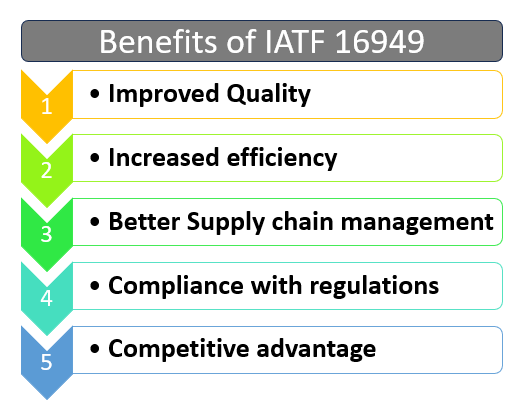The automotive industry is one of the most competitive industries. With customers demanding higher-quality products, it can be challenging to maintain a competitive edge. One way to stand out in the marketplace is to implement an IATF 16949 quality management system.
This article will explore the benefits of implementing an IATF 16949 quality management system for automotive manufacturers and suppliers.
What is IATF 16949?
IATF 16949 is a quality management system standard designed specifically for the automotive industry. It was developed by the International Automotive Task Force (IATF). The purpose is to help automotive manufacturers and their suppliers to establish and maintain an effective quality management system. The standard is based on ISO 9001, with additional requirements specific to the automotive industry.
Benefits of Implementing IATF 16949
There are many benefits of implementing IATF 16949 in an industry. Below is a list of some benefits.

Improved Quality
By following the requirements of IATF 16949, automotive manufacturers can ensure that their products meet the required standards. This can help to improve customer satisfaction and reduce the risk of product recalls or defects. The standard includes requirements for product design and development, process control, and continuous improvement, which can help manufacturers to consistently produce high-quality products.
Increased Efficiency
IATF 16949 includes a range of requirements that are designed to help automotive manufacturers operate more efficiently. By improving processes and reducing waste, manufacturers can save time and money, which can help to increase their competitiveness. For example, the standard requires manufacturers to use data and metrics to identify areas for improvement, which can help to streamline processes and reduce waste.
Better Supply Chain Management
IATF 16949 requires automotive manufacturers to work closely with their suppliers to ensure that they also meet the required standards. This can help to improve communication and collaboration within the supply chain, which can lead to better quality products and fewer delays. The standard includes requirements for supplier selection and evaluation, which can help manufacturers identify the best suppliers for their needs.

Compliance with Regulations
The automotive industry is highly regulated, and IATF 16949 includes requirements that are designed to help manufacturers comply with relevant regulations and standards. By following the requirements of IATF 16949, manufacturers can ensure that their products meet the required environmental and safety standards.
Competitive Advantage
By implementing an IATF 16949 quality management system, automotive manufacturers can demonstrate their commitment to quality and continual improvement. This can help to build trust with customers and suppliers and can give manufacturers a competitive advantage in the marketplace.
Certification to IATF 16949 can also help to increase the visibility of a manufacturer’s quality management system, which can help to attract new customers and improve business opportunities.
What is the importance of IATF certification?
It demonstrates compliance with industry standards:
IATF certification indicates that a company has established and implemented a quality management system that meets the requirements of the IATF 16949 standard. This demonstrates to customers, suppliers, and other stakeholders that the company is committed to producing high-quality products and continuously improving its processes.
It improves competitiveness:
IATF certification can give a company a competitive advantage by demonstrating to customers that its products meet the highest quality standards. This can help to attract new customers and retain existing ones, which can lead to increased sales and market share.
It can reduce costs:
IATF certification requires companies to continuously improve their processes, which can lead to increased efficiency and reduced waste. This can result in cost savings that can be passed on to customers or used to improve profitability.
It can enhance reputation:
IATF certification can enhance a company’s reputation by demonstrating its commitment to quality and continuous improvement. This can lead to improved relationships with customers, suppliers, and other stakeholders, which can lead to new business opportunities and increased success in the marketplace.
It is often required by customers:
Many automotive manufacturers require their suppliers to be certified to IATF 16949 to do business with them. This means that obtaining IATF certification can be essential for suppliers who want to maintain or grow their customer base.
Overall, IATF certification is important for companies in the automotive industry because it demonstrates their commitment to quality, improves competitiveness, reduces costs, enhances reputation, and can be required by customers.
What is the main goal of IATF 16949?
IATF 16949 emphasizes the development of a quality management system that provides for
- Continual improvement
- Defect prevention
- Reduction in variation and waste in the supply chain
Conclusion
Implementing an IATF 16949 quality management system can help automotive manufacturers improve their products, reduce costs, and increase their competitiveness in the marketplace. By following the requirements of the standard, manufacturers can ensure that their products meet the high standards expected by their customers.
This can demonstrate their commitment to quality and continual improvement. Whether you are a large manufacturer or a small supplier, implementing an IATF 16949 quality management system can help to improve your business operations and increase your success in the competitive automotive industry.
You may like to read about:

